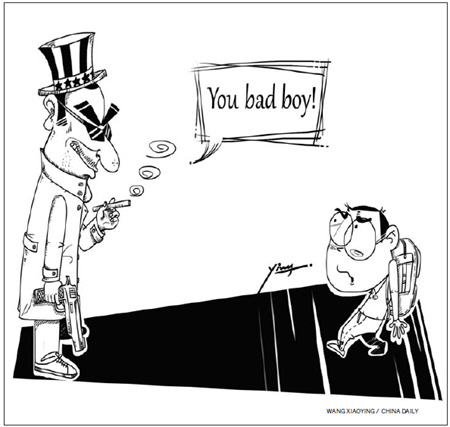
Many Chinese people blame the United States for playing up the "China threat" theory again after the US issued its annual report on China's military. The fact that such a thing as a "China threat" still exists means not only has the Pentagon failed to understand China's defense forces and their objectives, but also that Chinese officials have failed to explain China's position in such a way that people do not misunderstand China's necessity to defend itself.
The reason why the "China threat" theory has no credibility and deserves to either be ignored or treated with contempt is that even half-intelligent military analysts know that, first, while the US has hundreds of military bases around the world, China has none outside China.
Second, unlike the US, China does not seek to promote a doctrine or export even a lifestyle and, instead, accepts whatever government is in power in any country across the world at any given time. Finally, also unlike the US, China does not have a giant military industrial complex which has a vested interest in the expansion of the Chinese military.
China needs to have a modern and capable military force for the simple reason that almost every Chinese I have met knows that from the latter half of the 19th century to the founding of the People's Republic of China in 1949, the country was wrecked by war and half-controlled by foreign powers. Only after 1949, China started to develop the means to defend itself.
Also overlooked by the Pentagon is the fact the China's armed forces do not play only a military role but are also equipped to deal with many natural disasters that the country faces as well as those caused by human neglect and incompetence. From the 2008 Wenchuan earthquake to the Wenzhou high-speed train crash, and from mining accidents, mudslides and floods to blizzards and sleets that forced the shutdown of entire provinces, the armed forces have been there. In contrast, Hurricane Katrina and the BP Gulf of Mexico oil spill have shown that the US military does not play anything like an equivalent role.
In other words, the Pentagon should understand the People's Liberation Army's role in the life of the Chinese people before it makes uneducated guesses about its "intentions". Furthermore, I believe it is the role of those speaking at international forums on behalf of China to inform organizations such as the Pentagon the real differences between the role and goal of the Chinese military and the military objectives and foreign policy of the US.
However, China's emergence on the world stage not only requires other countries and their leaders and policymakers to understand China, but also for Beijing to increase its understanding of the political cultures of other countries. Chinese officials should improve their publicity skills to gain more understanding from the outside.
Much has been said about the necessity of making universities creative and innovative institutions by reducing bureaucratic power and involving professional educators in academic decisions. Likewise, officials should enhance their creative thinking level by listening to different views.
It is obvious from the many pronouncements that Chinese government officials have made that they lack the skills to deal with foreign and local media both, and don't have a good understanding of their cultural backgrounds. For example, I am yet to see an official spokesperson use humor as an effective debating weapon in the same way that US President Barack Obama's official spokespersons do.
Wang Yongping, the Ministry of Railways' former spokesperson, is one of many examples of those supposed to represent the public face of a government department getting indignant and flustered when they don't like a question. Chinese netizens' reaction to his performance demonstrates just how sophisticated young educated Chinese have become.
The response of some officials to the Pentagon's report was similar. To appear agitated and flustered and even angry while trying to answer a question that has no substance will not help clarify the truth.
As all professional communicators know, the best response to an audacious and unfounded claim is to merely smile and say nothing or to give a calm and measured response that undermines the very legitimacy of the claim and the person or organization making it.
The author has been a consultant for the East Asia Analytical Unit of Australia's Department of Foreign Affairs & Trade.
(China Daily 09/09/2011 page9)